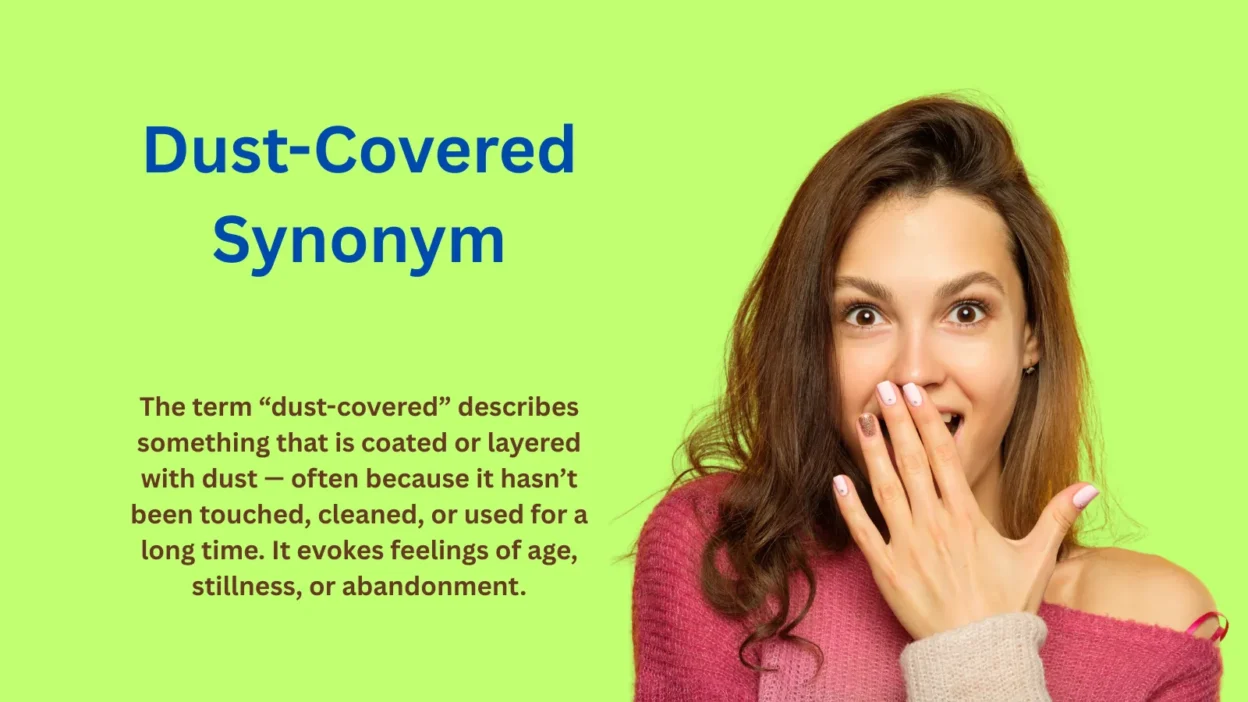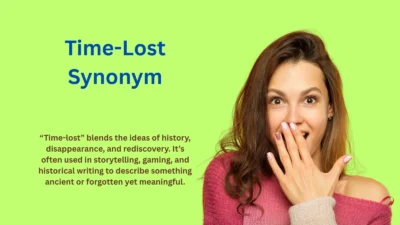Dust-covered synonym words like dusty, grimy, and dirt-coated describe something layered with dust or showing signs of neglect and time. For example, “The old piano sat dusty in the corner,” or “His books were coated with dirt after years of storage.”
Whether you’re describing forgotten spaces, vintage objects, or timeworn scenes, each synonym paints a slightly different picture — from gentle neglect to deep decay.
In this guide, you’ll learn the meaning and example sentences for each dust-covered synonym so you can express age, neglect, and atmosphere with accuracy and vividness.
What Does “Dust-Covered” Mean?
The term “dust-covered” describes something that is coated or layered with dust — often because it hasn’t been touched, cleaned, or used for a long time. It evokes feelings of age, stillness, or abandonment.
Examples:
- “The dust-covered photo albums sat untouched for decades.”
- “A dust-covered chair stood quietly in the attic.”
“Dust-covered” can describe both literal surfaces filled with dust and symbolic ones — like forgotten memories or outdated ideas.
Synonyms of Dust-Covered with Meanings, Examples, and Usage Tips
1. Dusty
Meaning: Covered with or full of dust.
Example: The dusty shelves told stories of neglect.
When to Use: The most direct and common synonym.
2. Grimy
Meaning: Covered with dirt or soot.
Example: The grimy windows blocked most of the sunlight.
When to Use: For a dirtier, darker visual tone.
3. Dirt-Coated
Meaning: Covered by a visible layer of dirt or soil.
Example: His dirt-coated boots showed how far he had walked.
When to Use: When emphasizing outdoor or rugged imagery.
4. Filthy
Meaning: Extremely dirty or covered with grime.
Example: The filthy workshop hadn’t been cleaned in years.
When to Use: Strong and vivid — for harsh or neglected scenes.
5. Soiled
Meaning: Stained or made unclean.
Example: The soiled curtains hung limp and forgotten.
When to Use: For literary, descriptive, or emotional tone.
6. Faded
Meaning: Having lost color or brightness over time.
Example: The faded wallpaper added to the antique charm.
When to Use: When describing timeworn or aged beauty.
7. Musty
Meaning: Having a stale, moldy, or dusty smell.
Example: A musty odor filled the old storeroom.
When to Use: Ideal for sensory writing — evokes smell and age.
8. Cobwebbed
Meaning: Covered in spiderwebs and dust.
Example: Cobwebbed corners revealed how long the place was abandoned.
When to Use: For eerie, neglected, or gothic settings.
9. Dirty
Meaning: Not clean; covered with dirt or dust.
Example: The dirty windows dulled the afternoon light.
When to Use: Simple, neutral, and versatile.
10. Neglected
Meaning: Left without care or attention.
Example: The neglected garden was now overrun with weeds.
When to Use: To imply emotional or time-based abandonment.
11. Worn
Meaning: Showing signs of long use or age.
Example: The worn sofa sagged under years of weight.
When to Use: For objects aged by both dust and time.
12. Timeworn
Meaning: Damaged or faded from long use or exposure.
Example: The timeworn clock ticked faintly in the silence.
When to Use: Poetic, nostalgic, and descriptive.
13. Sooty
Meaning: Covered with black powdery residue.
Example: The sooty fireplace hadn’t been used in years.
When to Use: When describing darkened or burned surfaces.
14. Grubbly
Meaning: Dirty, unwashed, or grimy.
Example: The grubbly floorboards creaked underfoot.
When to Use: Informal, vivid, and old-fashioned tone.
15. Tarnished
Meaning: Lost luster or brightness, especially in metal.
Example: The tarnished silver mirror reflected a dull image.
When to Use: Ideal for metal or antique descriptions.
16. Smudged
Meaning: Marked with dirt or dust.
Example: The smudged glass blurred his reflection.
When to Use: For surfaces showing handprints or streaks.
17. Weathered
Meaning: Worn or aged due to exposure.
Example: The weathered barn stood strong through the years.
When to Use: Evokes natural aging — outdoor objects or buildings.
18. Dingy
Meaning: Dull, dirty, and gloomy.
Example: The dingy curtains barely filtered the light.
When to Use: For atmospheric or emotional settings.
19. Blemished
Meaning: Marked or flawed on the surface.
Example: The blemished vase still held sentimental value.
When to Use: When describing imperfect yet cherished things.
20. Unclean
Meaning: Not free from dirt or dust.
Example: The unclean attic was thick with cobwebs.
When to Use: Neutral, formal, and descriptive.
21. Forgotten
Meaning: Left behind and untouched for a long time.
Example: The forgotten room told stories through its silence.
When to Use: Emotional or symbolic descriptions.
22. Old-Fashioned
Meaning: Outdated or belonging to an earlier era.
Example: The old-fashioned typewriter sat unused on a dusty desk.
When to Use: For nostalgic or historical writing.
23. Antiquated
Meaning: Extremely old or outdated.
Example: The antiquated books smelled of dust and age.
When to Use: Formal and elegant; ideal for academic or vintage tone.
24. Unkempt
Meaning: Untidy or messy in appearance.
Example: The unkempt library was layered in dust.
When to Use: Descriptive, implying long neglect.
25. Fusty
Meaning: Stale-smelling and dusty.
Example: The fusty air made him sneeze immediately.
When to Use: Evokes sensory details — smell and age.
26. Crusted
Meaning: Covered with a hardened layer of dirt or dust.
Example: The crusted frame hid the painting’s original glow.
When to Use: For heavy buildup or extreme neglect.
27. Aged
Meaning: Showing the effects of time and wear.
Example: The aged desk bore the weight of forgotten papers.
When to Use: Neutral or nostalgic — great for literary writing.
28. Unpolished
Meaning: Lacking shine or cleaning.
Example: The unpolished metal gleamed faintly under the dust.
When to Use: When describing dull, untreated surfaces.
29. Moth-Eaten
Meaning: Damaged or worn from disuse.
Example: The moth-eaten drapes still hung by the window.
When to Use: For textiles or vintage décor.
30. Decrepit
Meaning: Worn out or decayed from age or neglect.
Example: The decrepit mansion stood coated in dust and memory.
When to Use: Dramatic, haunting, and literary.
Choosing the Right Synonym for “Dust-Covered”
| Tone / Context | Best Synonyms |
|---|---|
| Simple / Neutral | Dusty, Dirty, Soiled, Faded |
| Descriptive / Literary | Timeworn, Weathered, Tarnished, Decrepit |
| Sensory / Atmospheric | Musty, Fusty, Cobwebbed, Dingy |
| Emotional / Nostalgic | Forgotten, Aged, Neglected, Worn |
| Strong / Harsh Tone | Filthy, Crusted, Grimy, Unkempt |
Cultural Tip
“Dust-covered” often carries emotional weight — it doesn’t just describe dirt, but time, memory, and stillness. Writers use it symbolically to evoke loss, nostalgia, or decay.
Choose softer synonyms like faded or aged for gentle nostalgia, and stronger ones like filthy or crusted for dramatic or horror settings.
Conclusion
Understanding the synonyms of “dust-covered” helps you express everything from gentle aging to complete neglect. Each word — whether musty, timeworn, or forgotten — adds a different emotional layer to your writing.
By choosing the right synonym, you shape your tone — poetic, eerie, nostalgic, or realistic. These words remind us that dust isn’t just dirt — it’s the quiet mark of time standing still.



